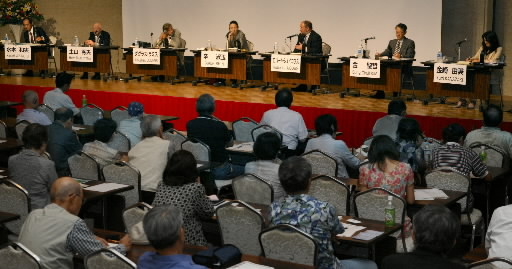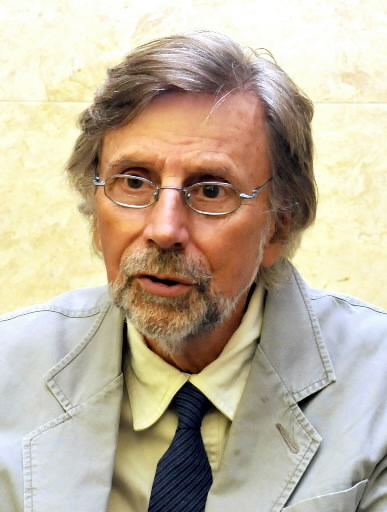International symposium on nuclear abolition held in Hiroshima on July 31
Aug. 2, 2010
by Junji Hayashi, Staff Writer
On July 31, the Hiroshima Peace Institute of Hiroshima City University and the Hiroshima Peace Media Center, a wing of the Chugoku Shimbun, jointly held an international symposium entitled "What Should We Do to Advance Nuclear Abolition?: Reflections on the 2010 NPT Review Conference" at the International Conference Center Hiroshima in Peace Memorial Park. Nearly 300 citizens of Hiroshima attended the gathering. Experts from the United States, South Korea, and the A-bombed cities of Hiroshima and Nagasaki exchanged views on concrete steps toward nuclear abolition as well as the role of citizens in this effort.
In a keynote speech, Hideo Tsuchiyama, former president of Nagasaki University, pointed out that the final document agreed upon at the Nuclear Non-proliferation Treaty (NPT) Review Conference held this past May is a product of compromise. He stressed the need for a nuclear weapons convention, saying that the fastest path to nuclear abolition involves conveying the voices of citizens to the Japanese government and the nuclear weapon states. Another keynote speaker, Douglas Lummis, an American political scientist and author and now a resident of Okinawa, said that, from the standpoint of the original Japanese meaning of "terrorism," the atomic bombings constitute the greatest terrorist act and that the nuclear umbrella is actually an umbrella of terrorism.
In the panel discussion moderated by Kazumi Mizumoto, a professor at the Hiroshima Peace Institute, Sugok Shin, Human Resources Development Consultant, Sung Chull Kim, a professor at the Hiroshima Peace Institute, Robert Jacobs, an associate professor at the Hiroshima Peace Institute, and Yumi Kanazaki, a reporter for the Hiroshima Peace Media Center, spoke on several themes.
Sugoku Shin touched on the consciousness of victim and victimizer as experienced by the Japanese and argued that anyone can become a victimizer when they ignore evident harm. She also stressed the importance of speaking out and expressing one's own opinion in the world. Sung Chull said that he would like Hiroshima and Nagasaki to serve as gateways for the voice of sufferers of Asia.
Robert Jacobs, originally from the United States, spoke about the U.S. identity as a military power and about the "world without nuclear weapons" advocated by U.S. President Barack Obama. He said with some passion that rather than relying only on U.S. leaders to take action, American citizens must make efforts to change the status quo.
Looking back on the 2010 NPT Review Conference, Yumi Kanazaki emphasized the importance of the appeals made by citizens in calling nuclear weapons unnecessary.
"The important task for those who study political thought is to convey the true meaning of words. In the original definition of the Japanese word 'tero,' which is equivalent to 'terrorism' in English, the atomic bombings constituted the greatest act of terrorism."
At this international symposium, Mr. Lummis mocked the contradictions of the United States, which rushed into its "war on terrorism."
The Japanese word "tero," he explained, originally comes from a reign of terror in 18th century France. Any indiscriminate attack on citizens that stirs terror is a terrorist attack, whether the attack is carried out by a nation or another entity. If the United States is serious about fighting terrorism, the real enemy is the United States itself. If our perspective changes, things that are familiar can be viewed differently.
Mr. Lummis remembers clearly how San Francisco, his hometown, exploded in joy when Japan, where the atomic bombs were dropped, surrendered unconditionally in August 1945. He was eight years old at the time. Later, he was shocked to learn about the devastating damage wrought by the bombings. This shock led him to question the violence we call war.
For a year, from 1960, when the United States became embroiled in the Vietnam War, he was dispatched as a Marine to Okinawa, which was under the occupation of the U.S. military. After retiring as a professor at Tsuda College in 2000, he went back to Okinawa, his wife's hometown, and lives there now.
Mr. Lummis is also known for his remarks on the Japanese Constitution. "The current constitution should be maintained," he argues. "Unless the preamble advocating peaceful diplomacy and Article 9 are truly fulfilled, the Japan-U.S. security arrangements will continue and the nuclear umbrella cannot be folded." His contention raises questions on the future of the constitution.
(Originally published by August 1, 2010)
On July 31, the Hiroshima Peace Institute of Hiroshima City University and the Hiroshima Peace Media Center, a wing of the Chugoku Shimbun, jointly held an international symposium entitled "What Should We Do to Advance Nuclear Abolition?: Reflections on the 2010 NPT Review Conference" at the International Conference Center Hiroshima in Peace Memorial Park. Nearly 300 citizens of Hiroshima attended the gathering. Experts from the United States, South Korea, and the A-bombed cities of Hiroshima and Nagasaki exchanged views on concrete steps toward nuclear abolition as well as the role of citizens in this effort.
In a keynote speech, Hideo Tsuchiyama, former president of Nagasaki University, pointed out that the final document agreed upon at the Nuclear Non-proliferation Treaty (NPT) Review Conference held this past May is a product of compromise. He stressed the need for a nuclear weapons convention, saying that the fastest path to nuclear abolition involves conveying the voices of citizens to the Japanese government and the nuclear weapon states. Another keynote speaker, Douglas Lummis, an American political scientist and author and now a resident of Okinawa, said that, from the standpoint of the original Japanese meaning of "terrorism," the atomic bombings constitute the greatest terrorist act and that the nuclear umbrella is actually an umbrella of terrorism.
In the panel discussion moderated by Kazumi Mizumoto, a professor at the Hiroshima Peace Institute, Sugok Shin, Human Resources Development Consultant, Sung Chull Kim, a professor at the Hiroshima Peace Institute, Robert Jacobs, an associate professor at the Hiroshima Peace Institute, and Yumi Kanazaki, a reporter for the Hiroshima Peace Media Center, spoke on several themes.
Sugoku Shin touched on the consciousness of victim and victimizer as experienced by the Japanese and argued that anyone can become a victimizer when they ignore evident harm. She also stressed the importance of speaking out and expressing one's own opinion in the world. Sung Chull said that he would like Hiroshima and Nagasaki to serve as gateways for the voice of sufferers of Asia.
Robert Jacobs, originally from the United States, spoke about the U.S. identity as a military power and about the "world without nuclear weapons" advocated by U.S. President Barack Obama. He said with some passion that rather than relying only on U.S. leaders to take action, American citizens must make efforts to change the status quo.
Looking back on the 2010 NPT Review Conference, Yumi Kanazaki emphasized the importance of the appeals made by citizens in calling nuclear weapons unnecessary.
Profile of Douglas Lummis, 73, political scholar and keynote speaker
by Yumi Kanazaki, Staff Writer
"The important task for those who study political thought is to convey the true meaning of words. In the original definition of the Japanese word 'tero,' which is equivalent to 'terrorism' in English, the atomic bombings constituted the greatest act of terrorism."
At this international symposium, Mr. Lummis mocked the contradictions of the United States, which rushed into its "war on terrorism."
The Japanese word "tero," he explained, originally comes from a reign of terror in 18th century France. Any indiscriminate attack on citizens that stirs terror is a terrorist attack, whether the attack is carried out by a nation or another entity. If the United States is serious about fighting terrorism, the real enemy is the United States itself. If our perspective changes, things that are familiar can be viewed differently.
Mr. Lummis remembers clearly how San Francisco, his hometown, exploded in joy when Japan, where the atomic bombs were dropped, surrendered unconditionally in August 1945. He was eight years old at the time. Later, he was shocked to learn about the devastating damage wrought by the bombings. This shock led him to question the violence we call war.
For a year, from 1960, when the United States became embroiled in the Vietnam War, he was dispatched as a Marine to Okinawa, which was under the occupation of the U.S. military. After retiring as a professor at Tsuda College in 2000, he went back to Okinawa, his wife's hometown, and lives there now.
Mr. Lummis is also known for his remarks on the Japanese Constitution. "The current constitution should be maintained," he argues. "Unless the preamble advocating peaceful diplomacy and Article 9 are truly fulfilled, the Japan-U.S. security arrangements will continue and the nuclear umbrella cannot be folded." His contention raises questions on the future of the constitution.
(Originally published by August 1, 2010)









